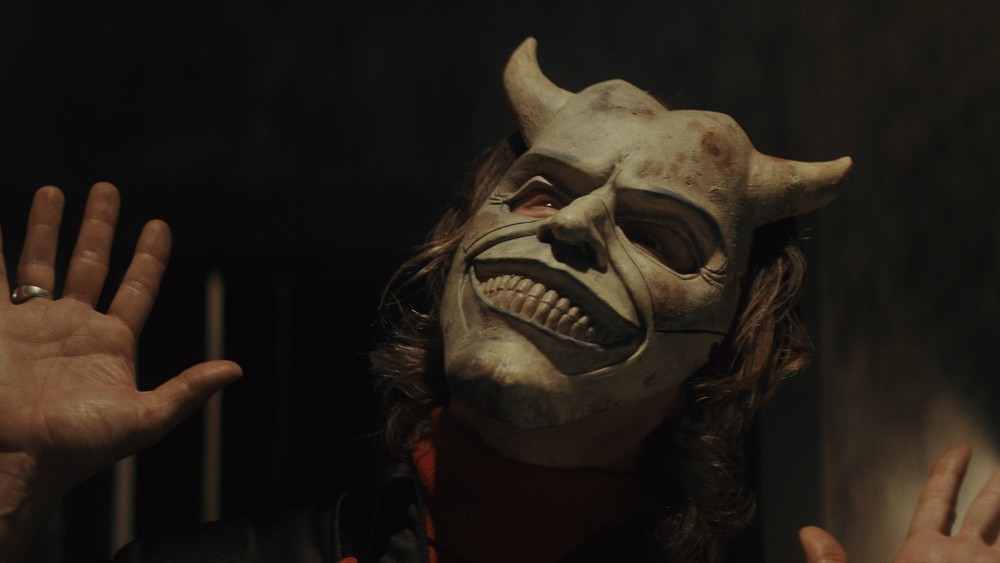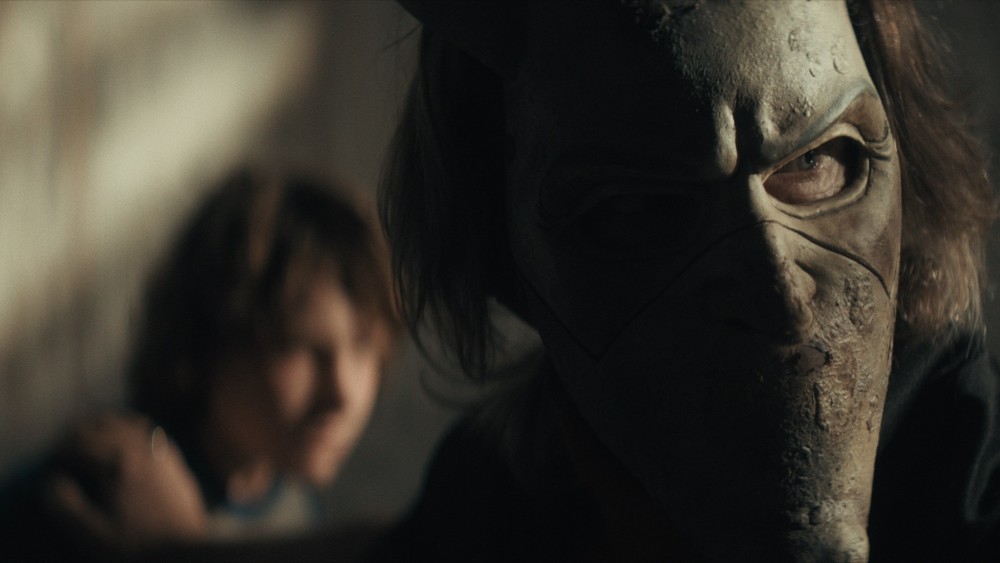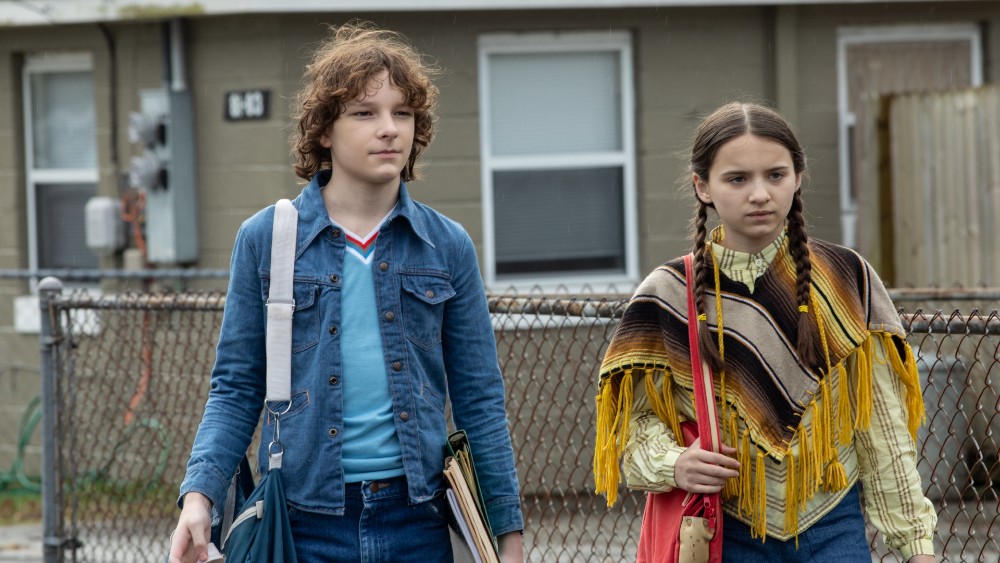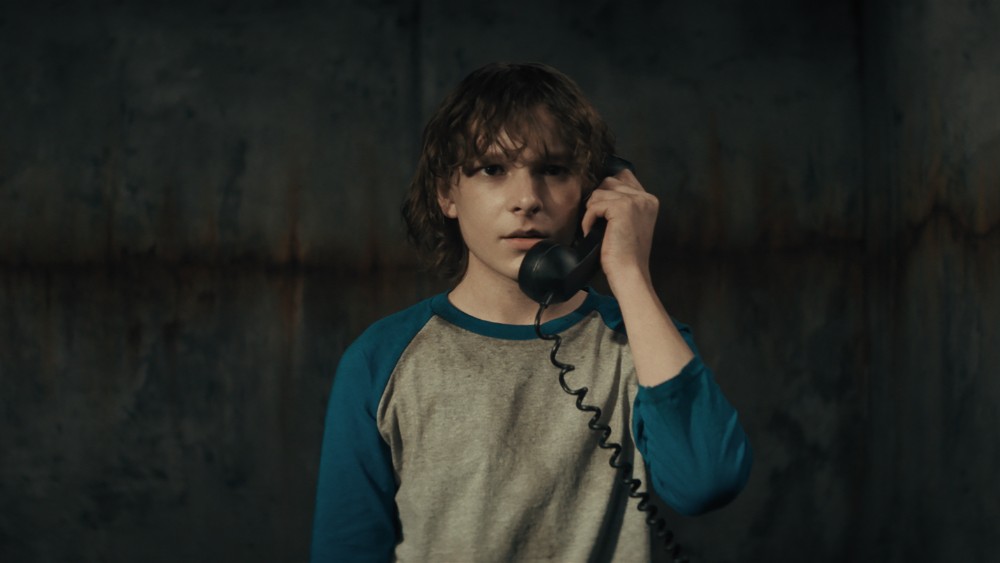
Director Scott Derrickson has had a pretty interesting career since making The Exorcism of Emily Rose in 2005. He helmed the Keanu Reeves-led remake of the classic sci-fi film The Day the Earth Stood Still, only to return to the horror genre with Sinister, which put him in business with prolific producer Jason Blum. and marked his first time working with Ethan Hawke. The success of that film led him to work with producer Jerry Bruckheimer on Deliver Us From Evil, and ultimately, with Marvel on Doctor Strange, which elevated him to an elite tier within the industry.
Doctor Strange hit theaters six years ago, and when Derrickson stepped away from directing the sequel, he already knew what his next movie would be — an adaptation of Joe Hill’s short story The Black Phone starring Hawke as “The Grabber,” a man who has been kidnapping boys in a Michigan suburb in 1978. The film stars Mason Thames as Finney, who becomes the Grabber’s latest victim and finds himself trapped in a basement that includes a mysterious black telephone.
Below the Line spoke to Derrickson on Zoom last week just a few hours before The Black Phone arrived in North American theaters almost nine months since it premiered at Fantastic Fest last September.

BTL: Congratulations on the movie finally coming out. I know it’s been a long road starting with Fantastic Fest. Did you make any changes since playing it at various festivals based on audience reactions?
Scott Derrickson: Minor ones. I think we made a few little tweaks here and there, but I’m always trying to… I don’t finish movies, I abandon them, when they’re ripped from my hands. I did an ADR line as late as six or seven weeks ago. I was like, ‘Oh, we could put this line here. We’ll clarify this,’ so I try to work on it until I literally can’t.
BTL: I know you’ve been working with Robert Cargill since Sinister, but did either of you have a connection to Joe Hill before approaching him about adapting his short story?
Derrickson: I had read the story when it was first published, the month it was published, 16 or 17 years ago. I just wandered into a bookstore and pulled it off the shelf and read the first short in it — it was amazing — and then I bought the book and read it. I thought about that short story ever since, The Black Phone. It’s not the best short story in that book, but it was the one that I felt was the best for a movie. When it came time recently to actually try to do it, turn it into a script, Joe and Cargill had already become really good friends as novelists because Joe loves Cargill’s novels. Joe invited him to be part of a little Inklings group. It’s Cargill and Joe and Neil Gaiman, and I think one other writer.
BTL: Cargill also came from entertainment journalism. I believe he was at Ain’t It Cool News for a while.
Derrickson: That’s how we got to know each other. I thought he was by far the best critic there, the only critic I really liked reading. After I’d seen the third or fourth movie, that he championed, that no one else seemed to like at that site. I emailed him. It was William Friedkin‘s Bug, and I was like, ‘You continually champion movies that I end up loving,’ and then we just started a correspondence. That’s how we got to know each other.
BTL: How did you bring Jason Blum on to produce The Black Phone?
Derrickson: Jason’s my closest friend in this business now. Jason and I are really, really good friends on a personal level, but my relationship with Jason started back after I had made The Day the Earth Stood Still. Nobody was offering me anything. I was kind of unemployable as a director for two years, and he came to me early in his career as a producer, and said, ‘I’ll give you $3 million and final cut, if you make me a horror film,’ because he loved Emily Rose. That’s how I made Sinister, and we’ve we’ve been really good friends ever since.
BTL: You did make Sinister during a period when Blumhouse was still fairly new. I don’t think Universal was involved at that point, and he was making movies for $3 to 5 million, so they all were profitable.
Derrickson: Not even at that point. I mean, the only thing he had done is he had acquired or found Paranormal Activity, and he was the one who brought that movie to Paramount. That was obviously a huge success, and James Wan had shot Insidious independently, and Jason saw that, I think at the Toronto Film Festival, and Jason was like, ‘I want to produce this, help you finish it.’ That was all he had done at that point, and so I was one of the first directors he went to with his new model of filmmaking.
BTL: That makes me wonder how making The Black Phone was different since Universal was involved. Are you making this movie for five times what you spent on Sinister, or still trying to keep the budget fairly low?
Derrickson: It’s a $17 million budget. It’s a period film, and it’s got a movie star in it, who deserves to get paid. It was a situation where I had written the script with Cargill while I was waiting for the script to be delivered on the sequel to Doctor Strange, the writer was taking way too long to deliver that script, so Cargill and I just went and wrote this. When I ran into real creative differences with Marvel and stepped off that movie, the script was right there, done and ready to go. It’s the most personal thing I’ve written, so I knew I’m gonna go make this. Jason was the only person I showed it to, so Jason said, ‘Let’s do it. Let’s make it.’
BTL: What was the timeframe for making the movie? It was obviously done in some form in September for Fantastic Fest, so did you actually shoot this pre-COVID?
Derrickson: No, we shot it in the middle of COVID, so it was a full COVID protocol production, which was challenging because it was rainy and muddy, and we were shooting in North Carolina. COVID shows are hard. Everybody’s in a mask, you can’t recognize anybody. It was a challenge, and it’s expensive to do the full COVID protocols. Everybody tested every day, all that stuff. But yeah, we made it at the height of… not the height of it, but we made that as soon as there was a viable protocol for making a movie during COVID.

BTL: Obviously, you worked with Ethan before, and he’s friends with Jason as well. How long before you went to him to play The Grabber? Was that also fairly early on in the process?
Derrickson: First person I sent it to. I think there were scheduling issues, at first, but when I first sent it to him, he said, ‘I don’t really play villains,’ which I had not thought about before, but he hadn’t really played a villain. I said, ‘Well, let me really talk you out of it. He’s a sadistic child killer, and he’s in a mask the whole movie.’ But he read it right away and left me a voicemail in the voice of The Grabber, saying one of the lines from the script and that’s how I knew he wanted to do it.
BTL: I assume he must have shot Moon Knight after this?
Derrickson: That was after. I think he made his deal on Moon Knight while we were shooting.
BTL: One of the interesting things about the movie was its setting in 1978. I was about Finney’s age that year, so seeing things like Emergency!, which was the show everyone watched at that time, brought me right back. How did you find a town where you could pull off the time period?
Derrickson: North Carolina was the place that made the most sense. There were only a handful of places that made sense for it financially in terms of tax breaks. I was very insistent that I set the movie in North Denver in 1978. I was 12 years old in 1978, and I really wanted to recreate my own memories of the ’70s and [the] kids I knew, and all of that. He said, ‘We’ll go and scout it,’ so I went there for four or five days and did a lot of scouting, and was able to find, kind of piecemeal, ‘Oh, these houses look exactly like the houses where I grew up. This section with all these chained fences, looks just like North Denver in the late 70s.’ I was really able to recreate with some pretty simple visual effects comps for the mountains and stuff like that. I also really was happy to shoot there when we shot there because I got gray overcast skies, which was the feeling I wanted for that time and place in the fall in Denver.
BTL: Did you shoot anywhere near where David Gordon Green shot his Halloween movies and where he’s based, essentially?
Derrickson: I think that there was some overlap there. I think Ryan [Turek, the film’s executive producer] had been down there already and shot something, and the crews were really good. Amazingly, the most surprising thing was the day players that we found. A lot of the kids in this movie are locals from North Carolina. I was really happy with what I was able to find in terms of local actors.

BTL: Were Maddie and Mason both from that area, as well?
Derrickson: No, no, Maddie is an L.A. kid — she’s on a Disney show. Mason was part of a really huge hunt. I got nervous — we almost didn’t find him, because I saw hundreds of kids and just wasn’t really confident that I had found anybody who could do the movie. We were reaching out to drama departments in high school and asking them to have their kids send in audition tapes. I think he was one of those. I don’t think he’d ever been in front of a camera before, and to discover a raw talent like that is pretty rare. I was very fortunate.
BTL: This seems like the perfect movie to make during COVID since a lot of it is him in the basement, and there are no big crowd scenes really.
Derrickson: Right, but it also puts the burden on him, because so much of the movie are close-ups of his face when he has no dialogue. I think that that is where his talent really shows, is his ability to emotionally process these scenes when he’s the only person on camera for minutes at a time. He just did an extraordinary job, I think.
BTL: How did you find Madeline? She’s kind of a scene-stealer in the movie. Everyone loves the fact she swears so much.
Derrickson: Oh, yeah. It was one of those situations where all the agents sent in tapes of their different kids. I’d seen lots of tapes already, but when I saw hers, I was like, ‘Oh, this is the girl.’ She just embodied that role so perfectly, and then, as I did callback auditions with her, I just recognized her ability to do pretty much anything. I think her performance during the whipping scene in particular is the best acting in the entire movie.
BTL: I think what I got out of the movie that maybe some younger critics didn’t was that I was around that time, and I know that was exactly what suburban life was in 1978. As a kid, you could literally go anywhere and do anything you wanted, and get into trouble, since parents didn’t really watch us or anything. The movie really captured that.
Derrickson: The key to selling the time and place had less to do with ‘Oh, put them in these shoes and make sure that they’re wearing bell-bottom pants’ or whatever. I didn’t want the audience to be distracted by fetishizing the ’70s. I wanted it to feel like the 70s, and, of course, there are a lot of visual things that make it feel like that, but I think what makes the movie really feel that way, are the rules of conduct, just the way that it was for kids then, at school, at home. I mean, I got beat like that often, and so did everybody on my block, and just the lack of supervision was just what it was like back then.
BTL: I do like asking directors about the team they put together, as well as how many of your department heads you had worked with before. How did you go about putting together this team?
Derrickson: You always want to bring certain people in if you can, but it’s the nature of the beast that they’re usually not available. When your show is suddenly greenlit, the people that you’ve worked with before, if they’re good, are busy on other things. I was fortunate Patti Podesta, the brilliant production designer, who I believe won an Emmy for Hannibal. I had done the pilot for Snowpiercer with her and had an amazing relationship with her and felt she was just great on this, so she came with me from that, so that was the second time I worked with her.
Brett Jutkiewicz, the director of photography, I’d never met. I loved his work on Ready or Not — I thought that both the lighting and the discipline and precision of the camera work, I felt like all of that was very confident and really good. It was really based on that movie that I approached him and felt like he would be a good partner. He’s probably my favorite DP I’ve worked with. He’s a very quiet guy, but we just had a real meeting of the minds. We only had 33 days to shoot this movie, and I had a lot of ambition in terms of precision camera movement in the basement to keep it sort of visually interesting, and to properly tell the story. So Brett and I, either shot listed or story-boarded every single scene in the movie before production started. So we knew exactly what the movie was that we were making before we even started.

BTL: It’s interesting to talk to directors who go back and forth between television and film. I spoke to Ti West a few months ago, and it was interesting to hear how he’s finding new creative collaborators working in television, but also he does it in order to bring what he does to their shows. It sounds like that was the case with finding your production designer, as well.
Derrickson: Sure. I think that they’re more accustomed to working with limited budgets and budget constraints, to get more bang for your buck. That’s certainly the case with Patti, and they tend to work faster. Television is so demanding, and then when you see somebody who can work within the constraints of that medium, and still deliver high production value and really deliver quality work, then that is especially helpful on movies that are bigger than the budget you’ve been given… which was the case on this one. [chuckles]
BTL: How do you feel at this point about doing another big studio blockbuster or are you feeling like you want to stay in this realm and doing genre pieces? What do you think is the next step in your career?
Derrickson: The next movie I’m likely gonna make is a big $150 million movie, but I don’t really care about the size or scale of the movie. For me, it’s all about the story. It’s all about the script. It’s all about what movie do I want to really make next? I don’t think strategically about that either. Ever since 2008, I made a decision at that time in my life [that] I’m never going to think strategically about doing… ‘Well, I gotta do a big movie now. I gotta do something more commercial than I’ll do something indie.’ I just treat every movie, like it’s the last movie I’m getting ever get to make. Because one day it will be.
BTL: Hopefully, you’ll be like 80 or 90 by then.
Derrickson: Hopefully, that’s 10 movies away. I mean, look at Clint Eastwood. He’s in his 90s and still making movies.
BTL: I do want to ask about Mark Korven, who did the music. How did you find him? Music and production design are two of the most important parts of horror movies working, but music and sound effects are especially crucial for the mood and tone of a film.
Derrickson: I think Mark is a really unique composer, and the only work I knew of his… I listened to some other stuff he’s done, but I knew I wanted to try to get him based on the [Robert] Eggers movies that he did. I thought the score for The Witch, and the score for The Lighthouse, very different scores, but what I like about his work is it’s not melodic. He doesn’t create real melodies, but he does create themes that are so right for the stories, and he uses interesting and unexpected instrumentation. I think that the tonal feel of his score is just different than what anybody else out there is doing. When I asked him to do the movie, we did a zoom, and I told him, that was why I really wanted him to do the film. We talked for maybe an hour, and then he said to me, ‘Look, in simple words, what do you want this score to sound like?’ I thought that was a really bold question, and I thought about it for a second. I said, ‘I want the score to sound like childhood fear.’ He paused for a minute, and he said, ‘Okay, I think I’m gonna do this.’ [laughs] ‘Really? You’re saying ‘yes’ in our first meeting? That’s wonderful.’
Not only was it a great collaboration, and I love his score for the film, but he is easily the fastest composer I’ve ever worked with. He’ll turn pieces around so quickly, and there were cases where he would give me a scene, and I’d be like, ‘Mark this is way off. This is not what I’m looking for at all.’ And I’ll use abstract descriptions of what I want. I am a novice musician myself, but I’m a good enough musician to be able to speak in musical language. I would then give him a whole different approach to something, and he turned it around so quickly, and it would be perfect.
He’s a really, really thoughtful guy. I just think he’s a unique animal in the world of composers right now. I hope I work with him again because I don’t think there’s anybody quite like him right now.
The Black Phone is now playing in theaters nationwide. All photos courtesy of Universal Pictures.





